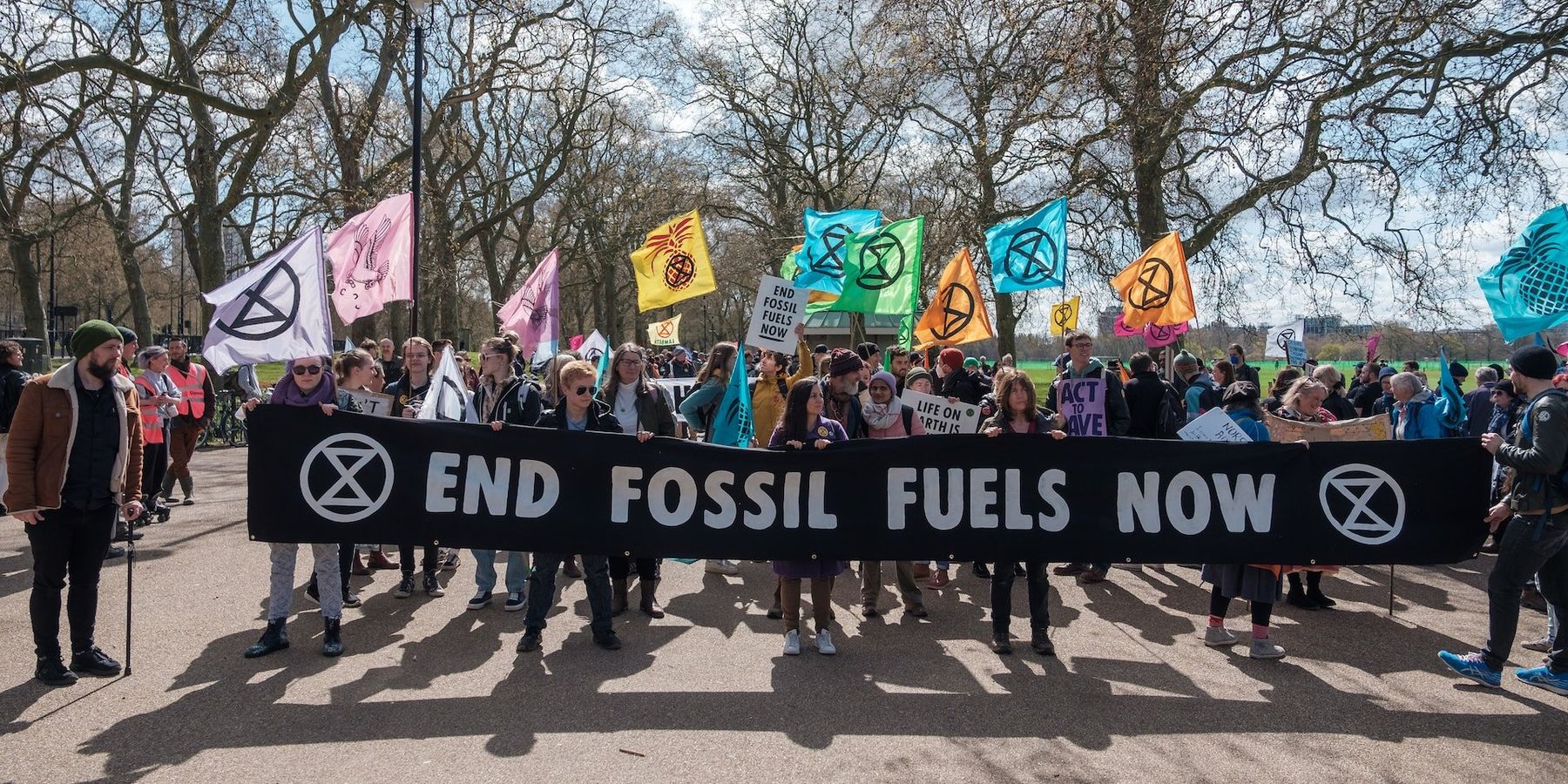
Should hospitals be next to divest from fossil fuels?
Universities, foundations and the Church of England already made the move.
PITTSBURGH — Last year, a group of climate-concerned doctors at the University of Pittsburgh Medical Center approached their bosses with a list of sustainability requests.
The leadership team agreed to most requests, with one exception: Divesting from fossil fuels.
To date, more than 1,500 institutions representing more than $40 trillion in assets have pledged to stop investing in fossil fuel companies, including universities like Harvard, Princeton and Cornell, city and local governments including New York City, San Francisco and Washington D.C., and major religious and charitable groups like the Vatican, the World Council of Churches and the Ford and MacArthur foundations.
One sector is largely missing: health care. The U.S. has more than 1,200 private hospital systems, which have an estimated $10 billion invested in fossil fuels.
“The healthcare sector is heavily invested in fossil fuels through its retirement plans and pension funds,” Don Lieber, a surgical technician and nursing coordinator at a hospital in New York City, told Environmental Health News (EHN). “This stands in contrast to the health sector’s highly publicized acknowledgement of the climate crisis as a health crisis.”
Health care “glaringly absent from the climate movement”

A few health systems in Europe have divested from fossil fuels, but only a few U.S. hospitals are considering the move.
Credit: Hush Naidoo Jade Photography/Unsplash
In 2022 Lieber, a longtime climate activist, partnered with the Climate Safe Pensions Network to launch First, Do No Harm, a campaign to pressure the health care sector to divest from fossil fuels. “The industry divested from tobacco companies in the ‘90s, so we know they can do this,” Lieber said.
Lieber said there are a few health systems in Europe that divested from fossil fuels, but he’d only heard of a few U.S. hospitals considering the move. In 2014, Gunderson Health System in Wisconsin announced it would freeze future corporate investments in fossil fossil fuels, but it’s unclear whether that happened. A Gunderson spokesperson declined a request for an interview, saying they were more focused on other sustainability intiaitives.
Some hospitals affiliated with academic institutions that have divested from fossil fuels have been included in those efforts. The University of California announced in 2020 that its investment portfolio was “fossil fuel-free” following the sale of more than $1 billion in assets, and a spokesperson for the university system confirmed that the divestment included the portfolios at the five hospitals affiliated with University of California.
Divestment is complex. It’s difficult to disentangle fossil fuel investments from passively managed, diversified funds (portfolios of stocks and bonds made up of investments in many different sectors), and many institutions have much of their money in these funds because they’re safer and cheaper than individually managed stock holdings. As a result, some institutions that want to divest end up leaving their investments in those diversified funds and divesting only their direct holdings in individual fossil fuel companies.

On top of that, the asset managers in charge of investments for large institutions have a “fiduciary duty” to maximize the value of the funds they manage, so they often have legal concerns about divestment. In other words, if they don’t invest in funds that include the fossil fuel sector — which are often among the most safe and profitable options — they expose themselves to potential litigations, since they’re not complying with their “fiduciary duty.”
The University of Pittsburgh — the academic institution the University of Pittsburgh Medical Center (UPMC) is affiliated with — has pledged to divest from fossil fuels by 2035, but a spokesperson for the university told EHN that UPMC’s investments are handled completely separately. UPMC is a large nonprofit with around 95,000 employees, its own health insurance plan, around 40 hospitals, and around 800 doctors’ offices. Clinicians for Climate Action made their divestment request specifically to UPMC.
“I’m not worried about it — I’m confident it will happen” Dr. Isabela-Cajiao Angelelli, a clinical director at UPMC Children’s Hospital of Pittsburgh, told EHN. Dr. Angelelli is a cofounder of Clinicians for Climate Action. There’s no timeline in place for divestment, Angelelli said, but “it will get done.”
The fossil fuel divestment debate

“Not wanting to own oil companies because they’re lying, polluting entities makes sense from a moral perspective, but I think we need a more rigorous conversation about whether it’s an effective strategy,"
says Lisa Sachs (above), director of Columbia University’s Center on Sustainable Investment.Credit: Columbia.edu
Not everyone believes divestment is an effective tool for curbing climate change.
“Not wanting to own oil companies because they’re lying, polluting entities makes sense from a moral perspective,” Lisa Sachs, director of Columbia University’s Center on Sustainable Investment, told EHN, “but I think we need a more rigorous conversation about whether it’s an effective strategy.”
Divestment doesn’t do much to impact the industry’s bottom line, Sachs said.
“When we’re talking about divesting, which just means selling shares, we’re talking about a secondary market,” Sachs explained. “The company that has issued those shares has already gotten that capital when those shares were initially sold.” In other words, selling fossil fuel shares doesn’t mean the company will lose that money — it just means ownership of those already-issued shares will change hands.
Sachs pointed to a 2021 analysis by researchers at Stanford University that found at least 86% of investors would have to divest in order to increase fossil fuel companies’ cost of capital (which essentially means their cost of doing business) by 1%.
“We’re not going to get 86% of shareholders to divest, and even if we did, that change in the cost of capital is too small to influence the behavior of a board of directors at a fossil fuel company,” Sachs said.
However, divestment can “delegitimize an industry, and that’s a very important signal,” Kathy Hipple, a finance professor at Bard College and former financial analyst at the Institute for Energy Economics and Financial Analysis, told EHN.

Another tactic involves holding onto shares and exerting influence over companies as a shareholder.
“If you’re divesting from shares for some moral reason, you are necessarily selling them to someone who cares less,” Sachs said. “If you keep the shares, then at least you have a voice as an owner.” She pointed to Engine No. 1, an activist investment firm that bought millions of shares in Exxon Mobil and installed board members who promised to drive more climate-friendly policies.
Hipple said that even if an institution keeps fossil fuel shares and takes an activist investor approach, they need the divestment option for leverage.
“You’ve got to have the threat of being able to say, ‘I’m not going to stay invested if you don’t do this,’” Hipple said. “If you take divestment off the table, that’s a key arrow taken out of your quiver.”
That’s what the Church of England did. The Church’s Board of Pensions, which had around $1.72 million invested in Shell, spent years working as activist shareholders, leading a climate-focussed investor group that fought to make the company align its business strategies with the Paris Agreement goal of limiting global warming to 1.5 degrees Celsius. But in June, the Church of England announced that Shell wasn’t taking sufficient action to limit global warming, so it would not only divest all of its pension funds from Shell, but would also divest around $13 billion from its Church Commissioners fund from all remaining oil and gas companies in its portfolio, including Shell, BP, Equinor and TotalEnergies.
“If your industry starts to get a black eye, that casts doubt on whether it will still be around in 20 or 40 years, which makes it difficult to attract top talent,” Hipple said. “We can tell from how aggressively the industry is lobbying against this that investors caring about climate change poses an existential threat to this industry, and divestment has played an important part in that.”
How can hospitals best fight climate change?
Asking private investors like hospitals and health systems to stand in for regulators is not the most effective approach, according to Sachs.
“The most effective thing we can do is to push our government to regulate the oil and gas sector and the economy, put a price on carbon and decisively shift the costs and liabilities of extraction onto the companies doing it in order to run them out of business,” she said.
“In the meantime,” she added, “I do believe owners in the economy have a responsibility to invest responsibly. It’s not a good option to do nothing just because certain strategies aren’t effective.”
She said rather than focusing exclusively on divesting, health care systems and hospitals should “give a mandate to their asset managers to prioritize being responsible stewards of their investments alongside making capital.” In practice, this would mean being active as shareholders and voting in alignment with a hospital’s mission for all of the stocks it holds; making new investments in industries helping the economy transition away from fossil fuels (like renewable energy and electric vehicles); urging companies they hold stocks in to leave industry associations that are lobbying against climate legislation; and asking the finance and stock portfolio companies that manage their assets to stop lobbying against government regulation.
“Financial institutions and asset managers are lobbying most rigorously against government regulation,” Sachs said, “so a critical part of investors’ engagement with them should be asking them to stop lobbying against regulatory climate action.”
Phyllis Barber, sustainability director for Highmark Health, a national health care organization headquartered in Pittsburgh, said that while the organization isn’t considering divesting from fossil fuels, the institution has tasked its asset managers to invest in funds aligned with the United Nations Principles for Responsible Investment, screening tobacco and e-cigarette companies out of its portfolios; purchasing bonds that support the healthcare industry and create affordable housing; partnering with local institutions to help finance community development projects and clean up brownfield sites; and considering investments in renewable energy funds.
“Our investment philosophy has always been health first,” Barber told EHN.
Measures like these are a step in the right direction, Sachs said, but “the whole conversation is often reduced to this idea that doing something ethically responsible has to come at the expense of being fiscally responsible… we should dispel that myth.”
Hipple agrees. She co-authored a study for the Institute of Energy Economics and Financial Analysis in 2018 that found divesting from fossil fuels is not only better for the planet, but also better for long-term financial growth.
“We know the fossil fuel industry will eventually be in secular decline,” Hipple said, “and the time to get out is before you see that decline happening.”













